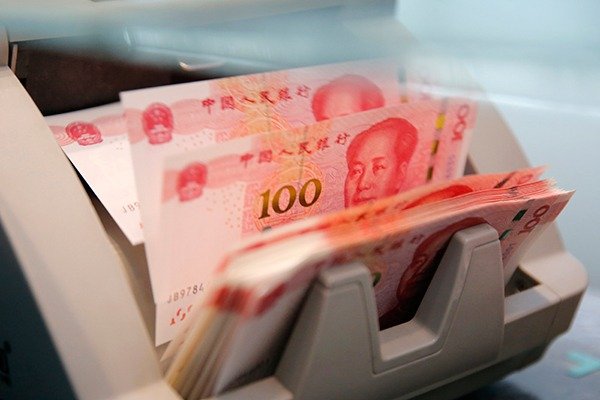CLN
Key News
Asian equities rebounded, and tariff talk became more bark than bite for Canada and Mexico as the U.S. dollar fell.
Hong Kong stocks rose on optimism that a Trump-Xi phone call would lead to a similar deal, though that failed to materialize by midnight (noon local time), indicating U.S. 10% tariffs would be implemented, which sent stocks lower. For the first time in a long time, against a clear negative with the media banging the doomsday drum, Hong Kong stocks rose. They rose on good volumes that were 118% of the 1-year average, even without Southbound Stock Connect, which remains closed and usually accounts for 40% of Hong Kong volume.
No matter what the nattering nabobs of negative say today, all you need to look at is CNH, China’s offshore traded currency, which appreciated overnight versus the U.S. dollar. Below is the China response, which was fairly muted.
Customs Tariff Commission of the State Council starting on February 10:
- 15% tariff on coal and LNG
- 10% tariff on crude oil, agricultural machinery, large-displacement vehicles, and pickup trucks
Ministry of Commerce:
- Added PVH Group (Calvin Klein) and Illumina to the unreliable entity list
China also filed a lawsuit with the World Trade Organization against the U.S. for enacting the recent tariffs.
The State Administration for Market Regulation reported that Alphabet is suspected of violating China’s anti-monopoly law and will be investigated.
Hong Kong exhibited high volumes, good breadth/advancers versus decliners led by growth stocks as Hong Kong’s most heavily traded by value were Tencent, up +4.11% on volume almost 50% higher than average, Alibaba, up +3.88% on volume almost 100% higher than average, and Meituan, up +5.97% on volume 136% of the average.
One interesting item I noticed was the Ministry of Commerce release stating that from January 20th to February 4th, 14.7 million consumers utilized the trade-in subsidy to buy 18.8 million mobile phones. It seems positive to me!
Baidu gained +3.43% after it announced that Baidu Intelligent Cloud integrated DeepSeek’s R1 and V3 models.
FTSE A50 futures are surprisingly barely higher than their pre-holiday close.
Only in time, and in hindsight, will the true impact of last Monday’s DeepSeek announcement become known. One definitive takeaway is how many popular and crowded US investment themes are. Semiconductors, nuclear, data centers, and technology all swooned simultaneously. Having witnessed the public equity consequence of DeepSeek, one has to wonder about the consequence on private equity as the open-source nature of DeepSeek must be most disconcerting. As Alibaba proved, there are multiple Large Language Models in China, proving the previous administration’s efforts to “hobble” China’s economy and technology sector failed. The U.S.-China geopolitical narrative is keeping many CFAs and MBAs from doing what they know they should be doing, which is buying low and selling high. Will a Trump-Xi phone call lead to a U.S.-China trip and/or summit? Last Monday has the potential to be a significant market moment, though time will tell.
The Hang Seng and Hang Seng Tech indexes gained +2.83% and +5.06%, respectively, on volume up +29.55% from yesterday, which is 118% of the 1-year average. 363 stocks advanced, while 128 stocks declined. Main Board short turnover increased by +42.92% from yesterday, which is 143% of the 1-year average, as 18% of turnover was short turnover (Hong Kong short turnover includes ETF short volume, which is driven by market makers’ ETF hedging). The growth factor and large capitalization stocks outperformed the value factor and small capitalization stocks. All sectors were positive, led by Consumer Discretionary, which gained +4.94%, Information Technology, which gained +4.45%, and Communication Services, which gained +3.63%. The top-performing subsectors were consumer durables, apparel, semiconductors, and autos. Meanwhile, the chemical industry, commercial & professional services, and environmental protection were among the worst-performing subsectors. Southbound Stock Connect was closed.
Shanghai, Shenzhen, and the STAR Board were closed.
Live Webinar
Join us on Thursday, February 6, 2025 at 11 am EST:
2025 Outlook: Investing in AI’s Present and Future
Please click here to register
New Content
Read our latest article:
2025 China Outlook: A Recipe For Re-Rating
Please click here to read
Last Night’s Performance
Chart1
Chart2
Chart3
Chart4
Last Night’s Exchange Rates, Prices, & Yields
Mainland China’s currency, fixed income, and commodity markets were closed overnight.







